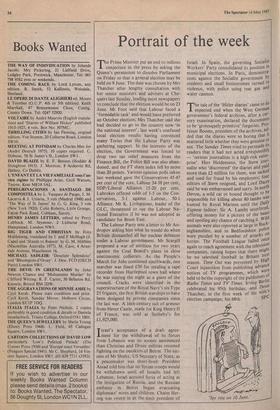Portrait of the week
The Prime Minister put an end to tedious conjecture in the press by asking the Queen's permission to dissolve Parliament on Friday so that a general election may be held on 9 June. The date was chosen by Mrs Thatcher after lengthy consultation with her senior ministers and advisers at Che- quers last Sunday, leading most newspapers to conclude that the election would be on 23 June. Mr Foot said that Labour faced a 'formidable task' and would have preferred an October election; Mrs Thatcher said she had decided to go to the country now 'in the national interest', last week's confused local election results having convinced many Tories that the Labour Party was gathering support. In the interests of the election, the Government was forced to drop two tax relief measures from the Finance Bill, the Police Bill was also aban- doned, and the FT share index fell by more than 20 points. Various opinion polls taken last weekend gave the Conservatives 45-47 per cent of the vote, Labour 34-38 per cent, SDP/Liberal Alliance 15-20 per cent. Labrokes offered odds of 1-5 on the Con- servatives, 3-1 against Labour, 50-1 Alliance. Mr K. Livingstone, leader of the GLC, threatened to sue the Labour Na- tional Executive if he was not adopted as candidate for Brent East.
The Labour Party sent a letter to Mr An- dropov asking him what he would do when Britain dismantled all her nuclear defences under a Labour government. Mr Scargill proposed a war of attrition for two years against the Coal Board's plans to close uneconomic collieries. As the People's March for Jobs continued southwards, one marcher was fined £50 for stealing a tape recorder from Hartlepool town hall where he was staying the night as a guest of the council. Cracks were identified in the superstructure of the Royal Navy's six Type 21 frigates, the first British warships to have been designed by private companies since the last war. A 16th-century suit of armour from Hever Castle, made for King Henry II of France, was sold at Sotheby's for £1,925,000.
Israel's acceptance of a draft agree- ment for the withdrawal of its forces from Lebanon was no sooner announced than Christian and Druze militias resumed fighting on the outskirts of Beirut. The suc- cess of Mr Shultz, US Secretary of State, as a peacemaker was short-lived: President Assad told him that no Syrian troops would be withdrawn until all Israelis had left Lebanon, Israel accused Syria of acting at the instigation of Russia, and the Russian embassy in Beirut began evacuating diplomats' wives and children. Chaim Her- zog was sworn in as the sixth president of Israel. In Spain, the governing Socialist Workers' Party consolidated its position in municipal elections. In Paris, demonstra- tions against the Socialist government bY students and small businessmen turned to violence, with police using tear gas and water cannon.
The tale of the 'Hitler diaries' came to its expected end when the West German government's federal archives, after a cur- sory examination, declared the documents to be 'grotesquely primitive' forgeries. Pro- fessor Booms, president of the archives, ad- ded that the diaries were so boring that it mattered little whether they were genuine or not. The Sunday Times tried to persuade its readers that it had not acted irresponsibly — 'serious journalism is a high-risk enter- prise'. Herr Heidemann, the Stern _lour; nalist who 'discovered' the diaries and Pala more than £2 million for them, was sacked and sued for fraud by his employers; four editors of Stern resigned, and Lord Dacre said he was embarrassed and sorry. In north Devon, a wild cat or hound thought to be responsible for killing about 80 lambs was hunted by Royal Marines until the DarlY Express (editor: Sir A. Lamb) interfered, offering money for a picture of the beast and spoiling any chance of catching it. Wild animals were also reported at large in Buck- inghamsbire, and in Bedfordshire police were puzzled by a number of attacks 00 horses. The Football League failed once again to reach agreement with the television companies, raising hopes that there might be no televised football in Britain next season. Time Out was prevented by High Court injunction from publishing advance notices of TV programmes, which were held to be the copyright of the publishers of Radio Times and TV Times. Irving Berl'.11 celebrated his 95th birthday, and Den,ls Thatcher, in the first week of his wife 5










































 Previous page
Previous page